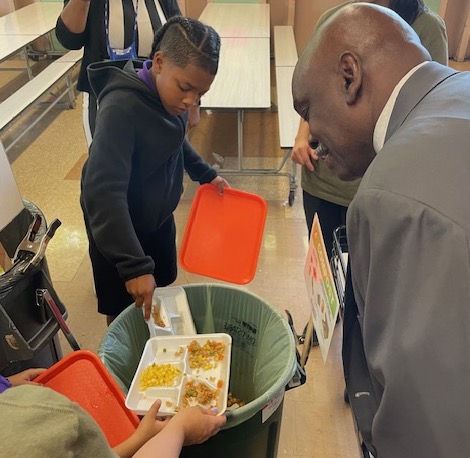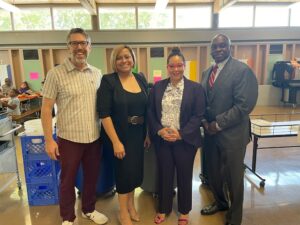
Contact: Becky Brodsky, becky@sevengenerationsahead.org
Release Date: September 26, 2024
Bellwood, IL – On Thursday, September 19th, 2024, Thurgood Marshall Elementary School in Bellwood took going green to the next level. They launched a composting program that will help them significantly reduce food waste in their cafeteria and kitchen.
This is the next step in their journey to zero waste. Seven Generations Ahead’s (SGA) Zero Waste Schools (ZWS) team helped launch the school’s first step into waste reduction when Thurgood Marshall brought recycling and share tables to their cafeteria in the 2023-24 school year. With that step alone, they were able to divert 50% of their waste from the landfill. Now that the school is composting, they have the potential to divert up to 90% of their waste.
“The composting initiative at Thurgood Marshall is a testament to our commitment to creating a more sustainable and environmentally conscious educational environment,” said Dr. Victoria H. Stockton, Bellwood School District 88 Superintendent. “We’re enthusiastic about the benefits this program will bring, from reducing waste to enhancing our students’ understanding of environmental responsibility.”
Thurgood Marshall was the first school in Proviso Township, and within the broader Cross-Community Climate Collaborative (C4), to launch a zero waste schools program. C4 is an award-winning initiative that brings together 14 communities in west suburban Cook County to share sustainability best practices and work together on equitable, large-scale climate projects. SGA is working with District 88 on district-wide waste reduction strategies, including right-sizing waste hauling services and implementing recycling and composting programs in all schools. Thurgood Marshall will be able to share experiences and best practices with other C4 communities, paving the way for more zero waste schools programs.

The launch event was a success, with both District 88 Superintendent Stockton and Village of Bellwood Mayor Andre Harvey in attendance. Mayor Harvey even took the time to help students at the sorting stations, demonstrating the community’s commitment to the program. One of Thurgood Marshall’s custodians enthusiastically participated, helping remove contamination from the bins and clarifying what items were recyclable. The meals from Thurgood Marshall’s new food service provider come unpackaged, which significantly aids composting efforts because students can now put the uneaten food from their trays directly into the compost container without the need to remove packaging.Thurgood Marshall’s next step in food waste reduction will be to implement Offer vs. Serve, giving students more choice in their meals, which can dramatically help to reduce food waste.
The waste audit revealed just how successful launch day was. Composting led to a significant increase in waste diversion from the landfill. After the school launched the first phase of its zero waste efforts last school year, it diverted 51% of waste from the landfill. With the launch of composting, that number has jumped to 81%. As they continue to refine their processes and add new reduction strategies, it could go even higher. Importantly, the students are enthusiastically embracing the changes.
SGA’s Zero Waste Schools program works throughout Chicagoland to help schools reduce food and plastic waste through recycling, composting, share tables, and other best practices. ZWS also educates kids about sustainability and how they can make change which gets them excited about adopting lifelong waste reduction habits. Thurgood Marshall’s successful composting launch demonstrates just how impactful these strategies can be.
“By introducing composting into our lunchroom sorting system, we can turn food waste into valuable soil instead of sending it to landfills,” said Sondra McClendon, Assistant Director of Operations & Planning for School District 88. “It’s a simple step that helps reduce waste, supports sustainability, and nurtures the environment – one lunch at a time.
